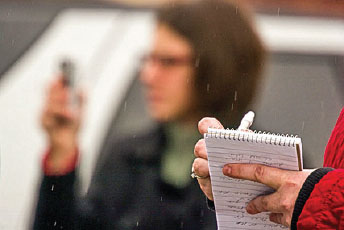On ethics and dinosaurs

Journalists are called to serve the public by keeping them well informed
I fear media ethics may soon go the way of the dinosaurs: extinct.
We are all familiar with the stories of the ethical failings of the American news media, from the Jayson Blair and Brian Williams scandals to errors in fact in local newspapers across the country.
It seems that media outlets are having to issue corrections or apologies for misinforming the public on a regular basis these days.
In the age of social media and the 24/7 news cycle, media ethics have become like the skeletal remains of some ancient dinosaur, buried in the dust of the past.
Journalists today seem to have adopted a 50-yard dash mentality, where whoever gets the story first wins — regardless of the truth or validity of the facts.
If it improves ratings or creates Internet traffic, that is all that matters.
In 2013, the Pew Research Center released a report stating that less than three in 10 Americans — 28 percent — thought that journalists contribute “a lot” to society.
Another 27 percent of those surveyed thought that journalists contributed “not very much” or “nothing at all.”
When approximately 55 percent of the country does not believe that journalists are contributing to society, something is not right.
Where have we newsmen and women gone wrong?
I believe the problem is with our memory. We have forgotten whom we are serving.
Journalists, by definition, are public servants.
As disseminators of information, they keep citizens informed as to what is happening in their own communities and around the world.
When we forget that we are serving other people and that we have been given their sacred trust, we keep our eyes on ourselves.
We begin thinking how we can improve our statuses and beat the other guy, and ethics fall by the wayside as we try to scramble to the top.
Because we have been entrusted with the minds and hearts of our viewers and readers, we owe them nothing less than the truth.
When we fabricate, plagiarize and otherwise misinform, we not only hurt ourselves, but the people we claim to serve.
Humility is a trait sadly lacking in the media today.
Ethical journalism is others-conscious journalism.
Brett Lott, the author of the book “Letters & Life,” asserts that storytelling is an art.
Journalists then, as storytellers, are also artists.
Lott writes, “We do not commit art in a vacuum but are a part of a society — of humanity — at large, and there we indeed have a role in that society, a role that can and will contribute to the harmonization of human activity at large.”
Ethical journalism is necessary because, as Lott says, we do not commit art in a vacuum.
Everything we do affects someone else. How can we “contribute to the harmonization of human activity at large” if we are not ethical?
I understand the panic that deadline pressure causes.
I understand the frustration that comes from seeking good sources and coming up empty.
I understand the exhaustion.
I understand the desire for success.
It is far more convenient to take the low road — to publish the story first and the facts later.
But in doing so, we cheat ourselves and each other.
We cheapen the value of journalism, turning it into a three-ring entertainment circus.
As the legendary basketball coach John Wooden once said, “If you don’t have time to do it right, when will you have time to do it over?”
Being an ethical journalist is hard work.
It requires a relentless pursuit of truth and a significant amount of humility.
So weary soul, do the research. Find the sources. Remember who you serve.
The dinosaurs will never rise again. They are long dead. Let us work to ensure that ethical journalism is not.
Graf is a feature writer.
